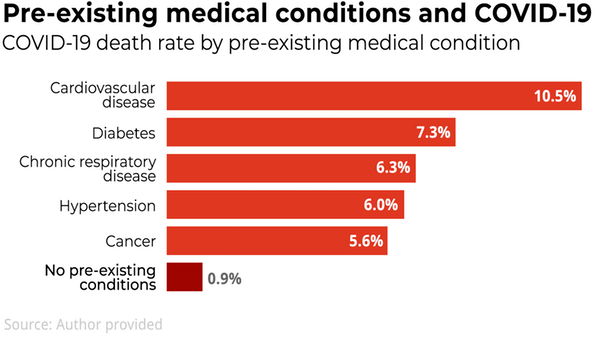As we learn more about COVID-19, it’s increasingly clear that your risk of severe illness and death increases with age.
Children under nine years of age seem to be largely unaffected, either with no or mild symptoms. None have died as a result of the infection.
People over the age of 80 years and those with chronic diseases are the most vulnerable. For those over 80, approximately 15% of those infected will die.
The death rate starts to increase for those over 50 years of age. Those under 50 years who are infected have a death rate of 0.2-0.4 per cent, while for those 50-59 years it’s 1.3 per cent.
For those 60-69 years it’s 3.6 per cent, for 70 to 79-year-olds it’s 8.0 per cent and for those over 80 years of age it is 14.8 per cent.
A similar picture is emerging when looking at the increased risk of severe illness and death of those with underlying conditions.

The death rate for those with no underlying chronic conditions is approximately 1%.
For those with cardiovascular (heart) disease, the death rate is 10.5 per cent, for diabetes, it’s 7.3 per cent.
Chronic respiratory disease (such as asthma and chronic obstructive pulmonary disease) has a 6.3 per cent death rate, for hypertension (high blood pressure) it’s 6.0 per cent and cancer is 5.6 per cent.
Why are older people at greater risk?
The likelihood of having chronic conditions increases markedly as you age. Four in five Australians aged 65 years and over have at least one chronic condition.But the presence of chronic conditions only partially explains the high death rate in older people.
As we age, our immune system weakens. This makes us more vulnerable to infections of all types. And any sort of challenge to the body can do more damage.
When the immune system gears up in older people, there is also a higher likelihood of a phenomenon called a cytokine storm. This is where the immune system overreacts and produces too many of the chemicals to fight infection.
So you get a severe inflammatory reaction which has the potential to cause significant damage in the body, including organ failure.
What about specific chronic diseases?
The biggest risk factor for dying of coronavirus is cardiovascular (heart) disease, with a death rate of 10.5 per cent. But we don’t yet know why.This doesn’t mean that infection necessarily causes a heart attack, just that people with underlying heart problems are more likely to become seriously ill and die from complications of coronavirus.
The increased risk of severe disease for those with diabetes, such as actor Tom Hanks, may be easier to understand. Diabetes depresses immune function and makes it harder to fight off viral infections.
Elevated glucose (blood sugar) levels in people with diabetes may also provide a more ideal environment for viruses to thrive.
The increased risk of severe disease from COVID-19 in people with a chronic respiratory illness such as asthma and lung disease (known as chronic obstructive pulmonary disease, or COPD) is perhaps the clearest, especially if your illness is not well controlled.
Respiratory conditions—such as uncontrolled asthma, which causes inflammation of the airways—are likely to be exacerbated by infection with COVID-19, which also targets the airways.
How can you reduce your risk?
If you fall into a vulnerable group, or have close contact with someone who does, be vigilant with hygiene.[su_box title="New UK government measures"]
by Stephanie Boland, Prospect
In the UK, the government has set out new measures to aid those with existing conditions in keeping safe.
Up to 1.5 million people identified as at higher risk of severe illness should they contract coronavirus will be contacted by the NHS and advised to stay at home.
There are also new plans to help groceries and medicines be delivered to them safely.
The government guidelines
- Strictly avoid contact with someone who is displaying symptoms of coronavirus (COVID-19). These symptoms include high temperature and/or new and continuous cough
- Do not leave your house for at least 12 weeks starting on Monday 22 March.
- Do not attend any gatherings. This includes gatherings of friends and families in private spaces e.g. family homes, weddings, parties and religious services.
- Do not go out for shopping, leisure or travel and, when arranging food or medication deliveries, these should be left at the door to minimise contact.
- Keep in touch using remote technology such as phone, internet, and social media.
- Do use telephone or online services to contact your GP practice or other essential services as and when you need.
While these measures may sound inconvenient or distressing, the government stresses that "for the individuals most at risk of the illness, these actions will save lives."
Anyone worried about symptoms can call 111, or 999 in an emergency.
Read more about the new measures on the government website here.
[/su_box]
Even if you’re young and healthy and not feeling particularly at risk of coronavirus, remember you play an important role in stopping the spread of the virus to those more vulnerable.
Some government are implementing additional measures to reduce the risk of older people becoming infected.
The UK government has also asked that no one visits aged care facilities unnecessarily and that people visiting elderly relatives for essential reasons keep their distance.
This article is republished from The Conversation under a Creative Commons license. It has been updated to remove outdated advice and include new information in the box above marked "new government measures." Read the original article.













